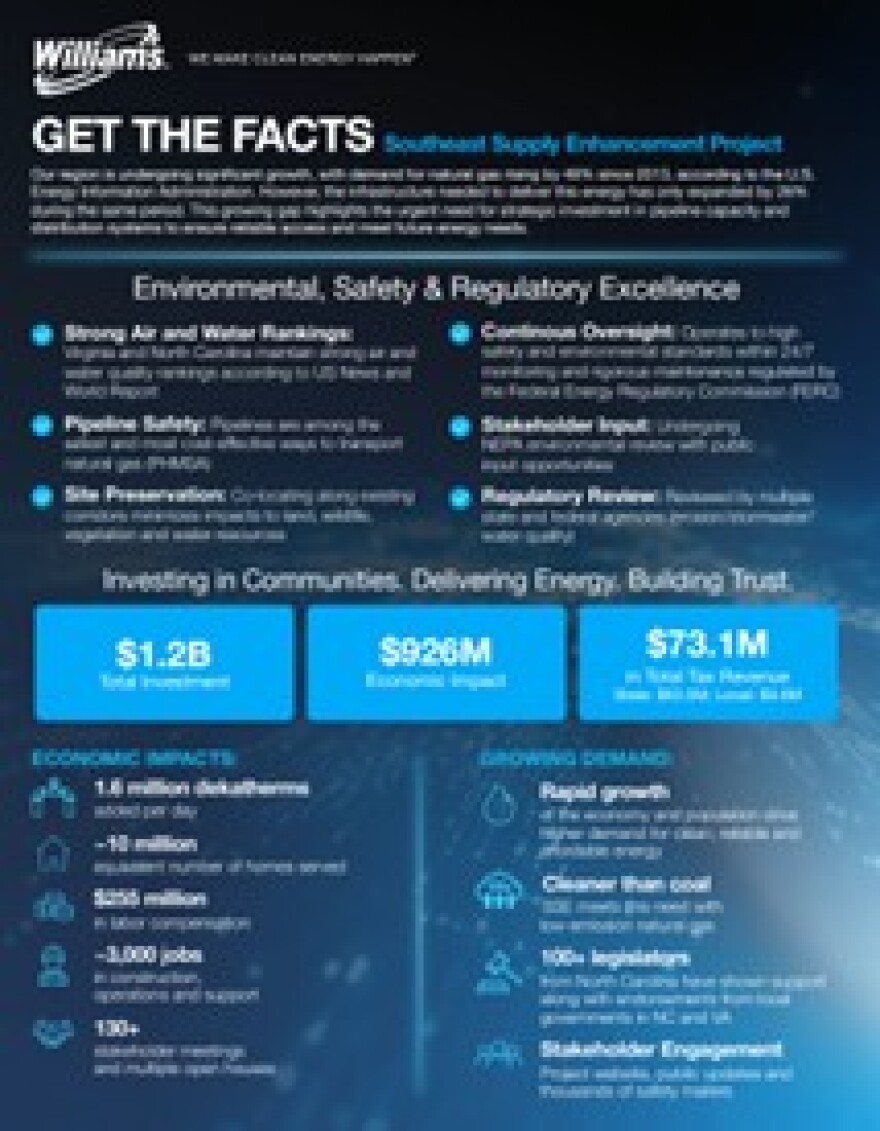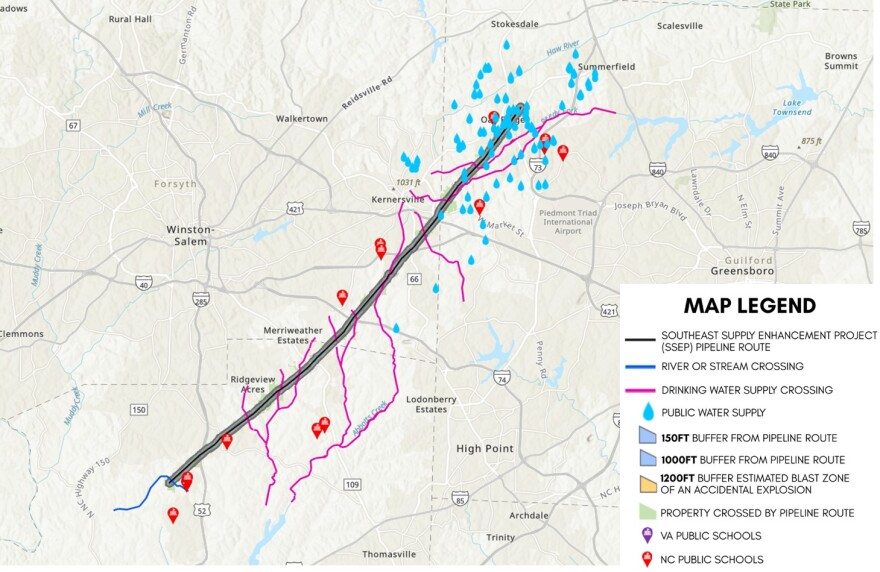Environmental advocates and concerned citizens are urging state officials to deny a water quality permit for Transco’s Southeast Supply Enhancement Project (SSEP), citing concerns over safety, environmental impacts, and consumer protection.
“Water is a sacred source of all life and should be treated as a beloved relative,” said Seth Harris, programs director at 7 Directions of Service, an Indigenous-led advocacy organization. “It's past time we do everything in our power to protect our water, and invest in North Carolina’s resilience, not waste money on dead-end polluting infrastructure like Transo’s SSEP.”
The North Carolina Department of Environmental Quality (DEQ) held a hearing Thursday evening in Kernersville in Forsyth County to hear comments from members of the public. State officials are accepting public comment online until Oct. 6. (Project No. 20240801; Version 2)
According to the N.C. DEQ, the project is proposed to include approximately 4.4 miles of 42-inch diameter pipeline in Rockingham County, known as the Eden loop. The project would also include construction of approximately 24.1 miles of 42-inch diameter pipeline in Guilford, Forsyth, and Davidson counties, known as the Salem loop. Finally, the proposed project would modify existing compressor stations and other facilities in Davidson, Cleveland, Iredell, Lincoln, and Gaston counties.
This project is part of a larger push to expand natural gas infrastructure across the U.S. Two other pipelines could also be built in North Carolina: MVP Southgate and Enbridge T-15.

The Moriah Energy Center is a proposed liquified natural gas facility in Person County operated by Enbridge Gas, which is also operating T-15. Finally, the Marshall gas plant and the Hyco Lake gas plants are facilities run by Duke Energy to generate electricity for its customers.
Why is this project needed?
In its permit application to state officials, Transco says this project is needed “to meet growing natural gas fired power generation, commercial, residential, and industrial demand in the southeast United States.” Transco says SSEP “helps support companies switching from coal to gas.”
Critics of the project say new pipeline infrastructure isn’t needed to begin with. Groups like the Southern Environmental Law Center contend resources should instead be put toward renewable energy.

“The Transco expansion project … represents a multi-generational investment in fossil fuels at a moment of deepening urgency in the climate crisis,” the law center said in a press release from October 2024. “If this Transco expansion project is approved, it will result in tens of millions of tons of greenhouse gas emissions every year, putting federal and state emissions reduction goals firmly out of reach.”
Natural gas contains several different components, the largest being methane, a potent greenhouse gas. According to NASA, methane is the second largest contributor to climate warming after carbon dioxide. The EPA estimates about 6.5 million metric tons of methane leak from the oil and gas supply chain each year. However, that number is very likely underreported, according to researchers at MIT and Johns Hopkins University.
In its application, Transco states renewable energies, like solar and wind, can’t meet the nation’s energy demand.
“Wind and solar energy sources cannot provide the reliable dispatch of load following energy generation that natural gas can provide, nor can they be made available at the scale necessary to meet customer' s required demand,” the application said.
Water quality concerns
The new pipeline is proposed to cross several dozen streams and wetlands across North Carolina, using mostly dry-open cut methods and trenchless technologies. In its application, Transco said it will follow best management practices to minimize and avoid impacts on waterways during construction.
However the group NO SSEP, which advocates against the pipeline, disagrees with these practices.
“This method of crossing water bodies degrades water quality, pollutes drinking water sources, and harms habitat for aquatic species,” said the organization.
Another group, Clean Water for North Carolina, recently released interactive maps showing the proposed route overlaid with the bodies of water it would cross.
“The Southeast Supply Enhancement Project (would damage) … drinking water sources, and that includes surface water as well as groundwater,” said Stephanie Gans, assistant director at Clean Water for North Carolina. “There are public water supplies … that are very close to the proposed path.”

Local governments pass resolutions urging regulators to take action
In late August, Forsyth County Commissioners passed a resolution urging state and federal regulators "to meaningfully address safety and environmental concerns regarding the Southeast Supply Enhancement Project and to deny approval of the project."
"This pipeline enhancement project raises a range of concerns for citizens, including, but not limited to, public safety risks, water resource impacts, environmental degradation, increased electric rates, and economic risks," stated the resolution.
The commissioners also pointed to Transco's poor safety record, according to data analysis by watchdog group Pipeline Safety Trust.
Guilford County Commissioners passed a similar resolution in June, as did the town of Midway in Davidson County in May.
If permits are approved, Transco anticipates construction of the project would start in March 2026, with some services coming online in December 2026. The full project is estimated to be completed by November 2027. State officials are expected to issue a decision on the permit in the fall.



